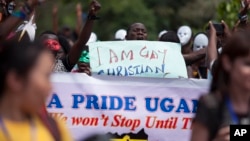For Uganda's Lesbian, Gay, Bisexual, Transgender community, daily life can be a struggle. Yet rather than shy away from the difficulties, some Ugandans are putting it all out there with Bombastic, the country's first LGBT magazine.
Distributed nationwide, the publication aims to cover LGBT-related topics and give voice to those who are often too fearful to come out in the socially conservative, landlocked East African country.
Created for homosexual and straight audiences with explanations on sexual orientation, commonly asked questions, political editorials and personal stories on the dangers facing LGBT Ugandans, the founding editors say the publication allows them to tell their side of the story in a country where anti-gay legislation has repeatedly made headlines.
An October 16 report by London-based Amnesty International said state repression is on the rise in the country, where repressive laws have been enacted in the past two years: The Public Order Management Act, the anti-Pornography Act and the now nullified Anti-Homosexuality Act.
Amnesty says that while the Anti-Homosexuality Act was in force, people who identified as, or were perceived to be, lesbian, gay, bisexual, transgender and intersex, or LGBTI, were arbitrarily arrested. It also said some were beaten and groped by police -- a violation of fundamental human rights.
“Over time people began getting so furious because they were told [LGBT people] are recruiting children and infecting them with diseases, [and] that turned the perception of people who never minded before," says Kasha Jacqueline Nabagesera, a prominent LGBT activist who helped create Bombastic.
Emphasizing the need to dispel fallacies at play in Uganda's national discourse on homosexuality, Bombastic allows the gay community to define the narrative on its own terms.
"They term it promotion of homosexuality, and we have seen in the past radio stations threatened to be closed down if they let us go on air, or radio hosts who have been suspended for hosting us, so the avenues for us to be able to engage some of the general public have all been closed," Nabagesera said. "We felt the need to come up with another means for us to be able to take out our message, and what better way than to use the same media.”
Writing of beatings, insults, job loss, so-called corrective rape and forced pregnancies, many of the contributors use pen names, though some have come out, posting their full name and picture.
Prospective distributors, however, are less open. When asked about carrying Bombastic on their own newsstands, Kampala-based vendors largely expressed indifference, though none would speak on record. Showing greater concern about the magazine's cost than its content, all of the vendors, upon learning that it is a free publication, said they would carry it.
Uganda's LGBT community celebrated last August when the Anti-Homosexuality Act was ruled invalid by the Constitutional Court. Although a new draft, dubbed the Prohibition of the Promotion of Unnatural Sexual Practices, has been leaked online, Nabasegara says the misinformation in the media surrounding the draft must be corrected.
“When you say 're-table,' [it] means you are bringing back an old bill — this is one thing the international community is not getting ... there is nothing in our parliament as I speak," she said. "There is no law; there is no bill to be passed in our parliament ... Some people say they want to petition, but there is nothing to petition. Why do you think we are not petitioning ourselves? For us we are waiting, because we have a legal team, remember, that we work with to challenge all of this. We are all quiet until it becomes a document of the parliament.”
Parliament's recess concludes in February, which could prove a difficult time for the LGBT community if the draft is introduced. But until they are shut down legally, Nabagesera says, they will keep distributing and promoting the publication.




